Your Cart is Empty
Menu
-
- Shop by Type
- End of Line Sale Items
- New In
- Viking Gifts Under $40
- Hand Forged Axes
- Silver Viking Jewelry
- Stainless Steel Jewelry
- Cremation Jewelry
- Necklaces and Pendants
- Hand Carved Wooden Pendants
- Kings Chains
- Viking Drinking Horns
- Pendant Chains
- Rings
- Bracelets
- Earrings
- Beard Beads and Beard Rings
- Collectables
- Ceramic Mugs
- Street Wear
- Horn Jewelry
- Bronze and Pewter Jewelry
- Shop by Theme
- Viking Axe
- Celtic Jewelry
- Dragon or Serpent
- Viking Raven
- Wolf / Fenrir
- Rune Jewelry
- Odin Jewelry
- Ram / Goat
- Shieldmaidens / Lagertha
- Sword, Spear or Arrow
- Thor's Hammer / Mjolnir
- Tree of Life / Yggdrasil
- Helm of Awe / Aegishjalmur
- Triquetra or Triskelion
- Valknut / Knot of Slain
- Vegvisir / Viking Compass
- Veles / Bear
- Blogs
- Help
-
- Login

Loki

Loki appears in Norse mythology as one of the Aesir gods, even though he descends from the race of the giants.
Loki's relationship with the gods varies from myth to myth: in some he helps them, in others he acts as their adversary. His mythological function is usually described as that of a trickster.
Loki is the father of the three arch enemies of the Aesir: The Midgard Serpent Jormungandr, the giant wolf Fenrir and the underworld goddess Hel. The three play prominent roles at Ragnarok, where they slay some of the most powerful gods.
Despite many attempts, Loki's name has not been interpreted etymologically in a satisfactory way. Researchers have put forward many theories about Loki's development and origin, the meaning of the mythology surrounding him, the possible connection between him and the air or fire, and a possible resemblance to the god Lodur.
The most common view is that Loki's significance should be understood primarily in a cosmological context and that he shows the dependence of the gods on the giants.
That is, he was a symbol of man's total dependence on the forces of nature. Loki and the mythology surrounding him are known primarily from the myths of:
- Younger Edda
- Elder Edda
- Heimskringla
- Runic Poems
- Skjaldedigte
Sources from pre-Christian times are much more uncertain, Loki is perhaps depicted on a stone from Snaptun in Denmark and on two stone reliefs from Kirkby Stephen Gosforth in England.
Characteristics
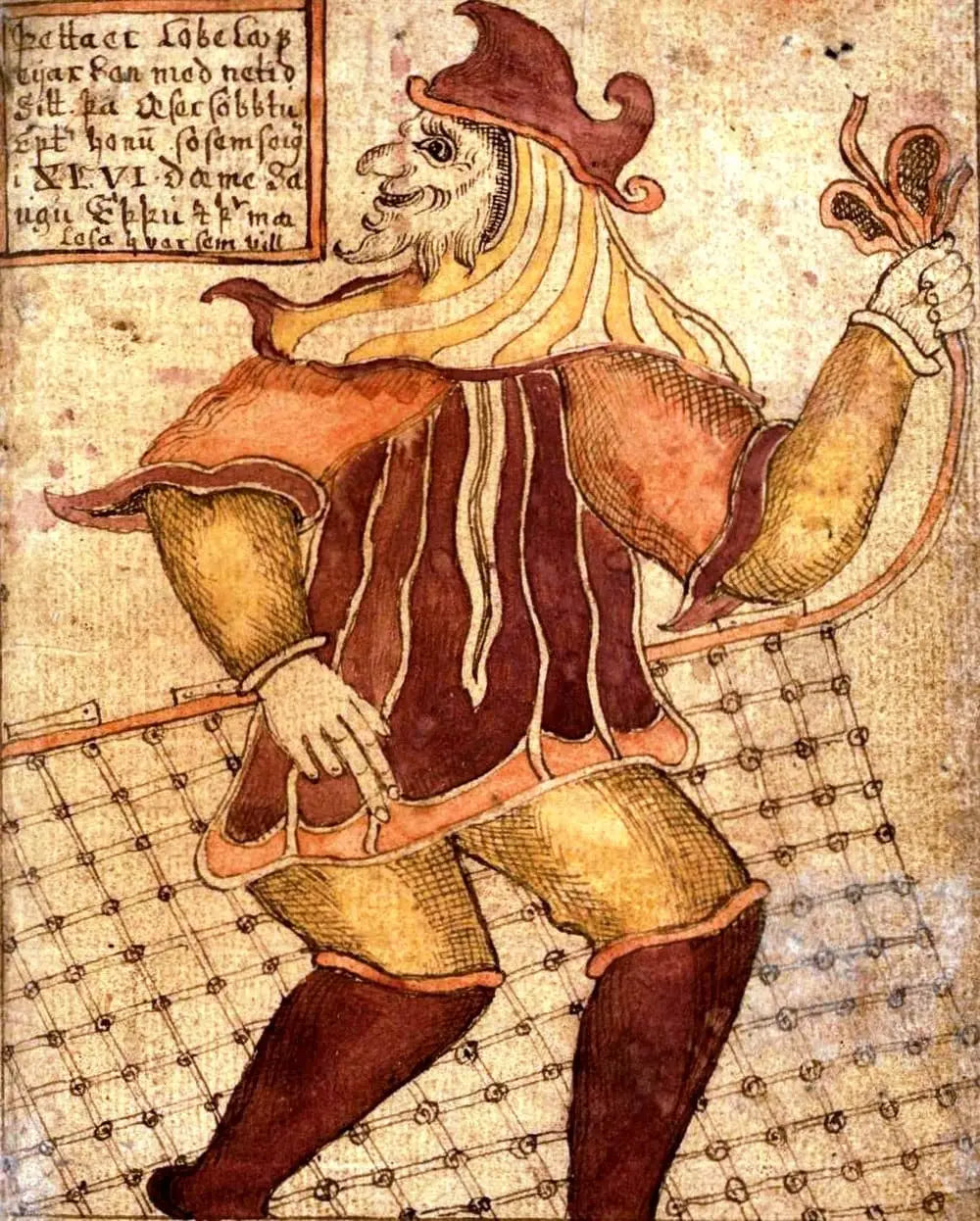
Loki is a giant, but also Odin's blood brother. Gro Steinsland believes that he characterized a link between the lineages of the Aesir and the Giants, his appearance serves to underscore the gods' real dependence on the powers of the Giants.
In the sources he is described as handsome in appearance, but at the same time as the most devious of the gods. As a mythological figure, he is psychologically almost as complex as Odin.
Loki is not uniquely evil; in some of the myths he appears as a helper to the gods, whose advice often brings them out of an immediate crisis, for example when he rescues Thor from a few dangerous situations, and in the myth of Thjazi, where he brings Iduun's apples of life back to Asgard.
But in other myths he is their main adversary and the one who brings them down at Ragnarok. He and Thor and Odin are the gods who appear most often in the myths, which must mean that he has played a decisive role in the mythological system.
The Australian scholar Margaret Clunies Ross believes that the myths should be understood in an overall chronological framework. In the early period he is the support and helper of the gods, rescuing them from several crises with the more destructive giant forces.
Gradually he becomes the gods' adversary as his own lineage is corrupted and deceived. Therefore, he makes Hodr shoot Balder with an arrow made of mistletoe, which is the only thing that could kill Baldr.
Now begins the events that lead to the end of the world and to Loki leading the giants at Ragnarok in revenge. Before the final doom, he remains chained like his offspring Fenrir.
Loki has abilities as a shapeshifter; in various stories he appears as a mare, a seal and a salmon. Loki's background often explains his actions in the myths and why in some cases he helps the gods, while bearing much of the blame for Ragnarok.
His father was the giant Farbaute and his mother Laufey, whose parentage is uncertain, Clunie's Ross, for example, believes her to be of Axis lineage. His brothers were Byleist and Helblind.
With his wife Sigyn he had the sons Vale and Narfe, while with the giantess Angerboda he had Fenrir, who in Ragnarok will devour Odin, the Midgard Serpent also known as Jormundgandr, who will become Thor's enemy and the goddess of death Hel.
These three sinister creatures symbolized chaos in Norse myrhology. Loki also became the mother of Odin's eight-legged horse, Sleipnir, when he had transformed himself into a mare.
Role in Baldr's death
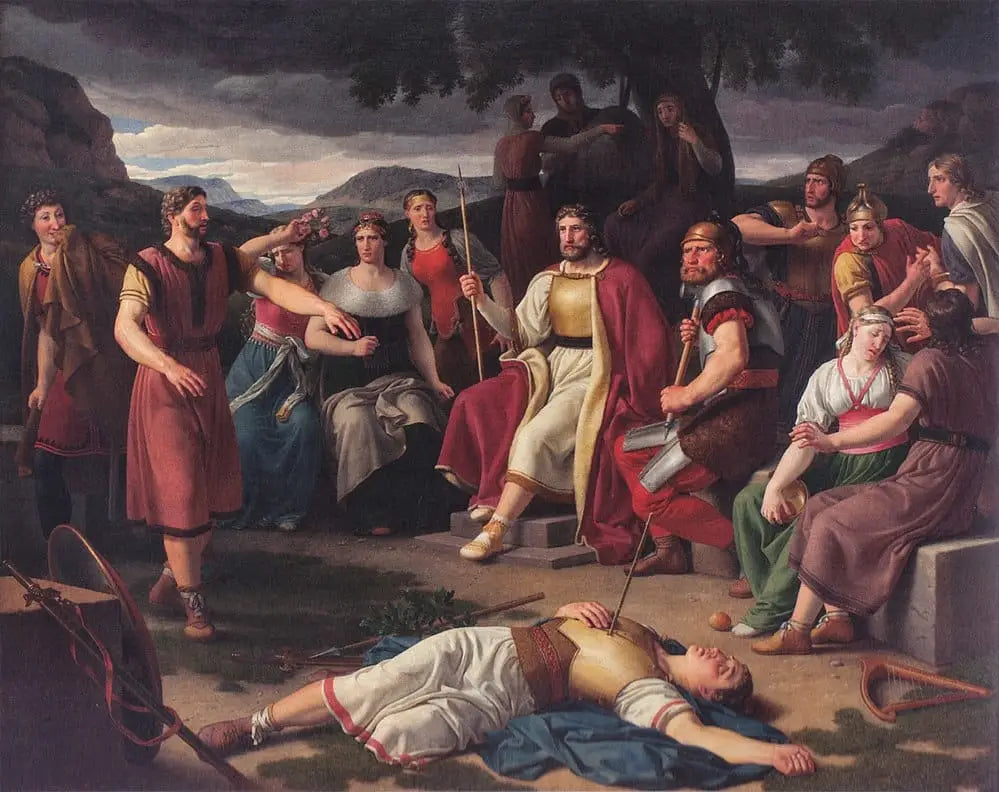
Loki's positive relationship with the gods ends when he causes the killing of Baldr. The latter is the representative of the stable world order, where the gods can control the forces of the cosmos. The events surrounding the killing are known from several texts, including Völuspá.
It reflects the Nordic tradition surrounding Baldr's death. The story can be pieced together from the individual sources: Baldr dreams of his own death. Frigg, his mother, swears all things not to harm Balder.
However, she forgets the mistletoe. To celebrate Baldr's invulnerability, the gods shoot several objects at him which none causes his death. The blind Hodr wants to join in the game and Loki, in female form, provides Hodr with an arrow made of mistletoe.
The arrow hits Baldr and he falls dead. After Baldr's journey to the underworld, Hermod seeks out Hel to get Baldr back. Hel makes the condition that if everyone and everything in the world will mourn Baldr's death, he will be allowed to leave the underworld.
The giantes Thokk refuses to mourn Balder. The gods quickly figure out that she was Loki in disguise, capture him and devise a fitting punishment.
The poem Baldr's Dream is about Odin's journey to the underworld to question a seeress about the meaning of Baldr's dream of his own death. Odin's goal is to question her, in order to change the inevitable and influence future events through the knowledge of the seeress.
Although Loki does not appear directly as a character in the poem, Swedish literature professor Mats Malm believes that Loki is so essential to the whole theme of Baldr's Dreams that he must be present at the end of the poem, even if it is never mentioned.
The form of the poem is special, as it contains both elements of walking legend and of mockery (''senna''). Like other seeresses, she is awakened in her grave and gives her answers only reluctantly.
The poem ends with a lively exchange of taunts. The interpretation of the poem has long caused problems. Malm suggests that it is related to power rather than knowledge; as, for example, the Völven's Divination.
Malm suggests several possible identities of the seeress; she may be Angerboda, mother of the three greatest monsters, or Thokk, who by her refusal makes Ragnarok possible, and who is Loki in disguise.
The poem may reflect an older tradition that Baldr should be wept out of Hel, which is prevented by Thokk, whom Odin has apparently met beforehand. In fact, the seeress may be associated with both Angerboda and Thokk, although logically they would be mutually exclusive based on the other descriptions we know of the two figures.
But Malm points out that illogical relationships are not uncommon in myths; mythologies are not necessarily consistent throughout. According to Malm, Loki connects the two figures, and is himself related to Ragnarok.
The fact that Loki is referred to as the mother of the three monsters is perhaps done to mock him, cf. their quarrel and mockery in Lokasenna. In Gylfaginning, Loki twice dresses as a woman in order to kill Baldr, first to win Frigg's favour and second as Thokk.
Baldr's draumar may be a reflection of a parallel myth in which Loki and Hodr act as double assassins. Malm concludes that it cannot be determined with certainty whether the seeress is a seeress or Angrboda, Thokk or Loki, but elements from all four figures run together in the poem:
That Ragnarok is inevitable because the old world order, in which the Aesir can control the giants, is overturned in the course of the poem: what begins as a classical game of go (in which the gods have always won over the giants so far) ends as a ''senna'', showing that Odin's power has been broken.
Loki's punishment
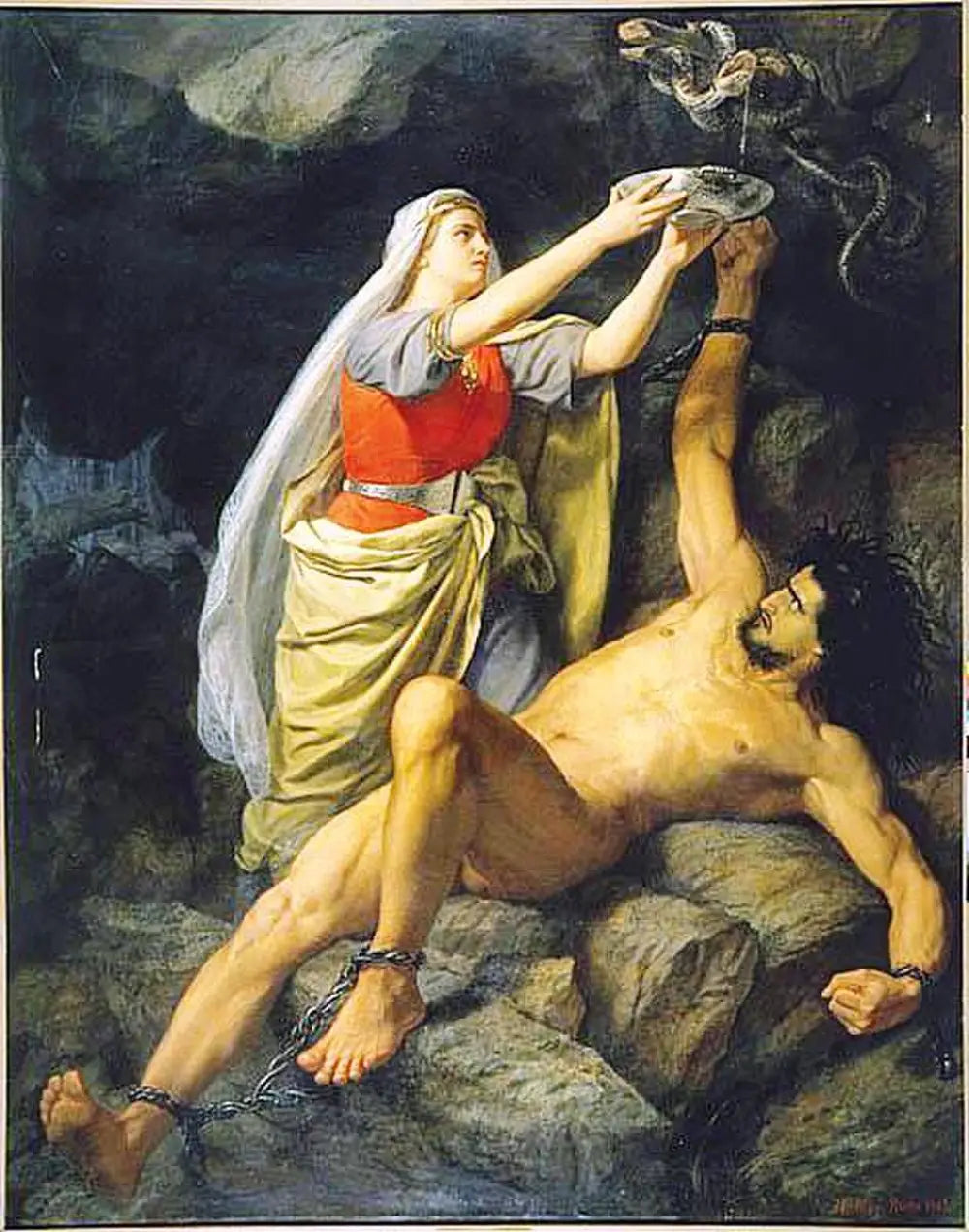
Loki's punishment is mentioned in Völuspá, in the prose accompanying Lokasenna, Hyndlaljóð and in Gylfaginning. The reason for Loki's punishment is implicit in Hyndlaljóð and Völuspá, as his punishment is referred to immediately after Balder's death.
In Lokasenna Loki directly admits his guilt, while it is more unclear in Gylfaginning The fullest description is in Gylfaginning. Here the punishment is brutal: the gods chain him in a cave in a mountain in Jotunheim.
Here he must stand with millstones around his neck, stomach and knees, so that he cannot move. Here he lives without wet or dry. To make sure Loki won't break his chains, the Aesir have bound him with the intestines of his son, Narfe.
The Aesir won't commit murder, though, so they turn Narfe's brother Vale into a wolf and wait for the two brothers to get into a fight. Vale, unfamiliar with his new strength as a wolf, rips Narfe apart, and the Aesir use his intestines as chains.
A snake is placed over Loki's head, dripping its venom onto Loki's face. It is so painful that Loki shivers and trembles; when this happens, the mountain shakes too.
Loki's wife, Sigyn, loves him so much that she has come with him to the cave. Until Ragnarok, she stands holding a vessel that collects the poison before it reaches Loki's head.
But sometimes she has to empty the vat and Loki and the whole mountain tremble with him. The snake over Loki's head was Skadi's idea.
Ragnarok
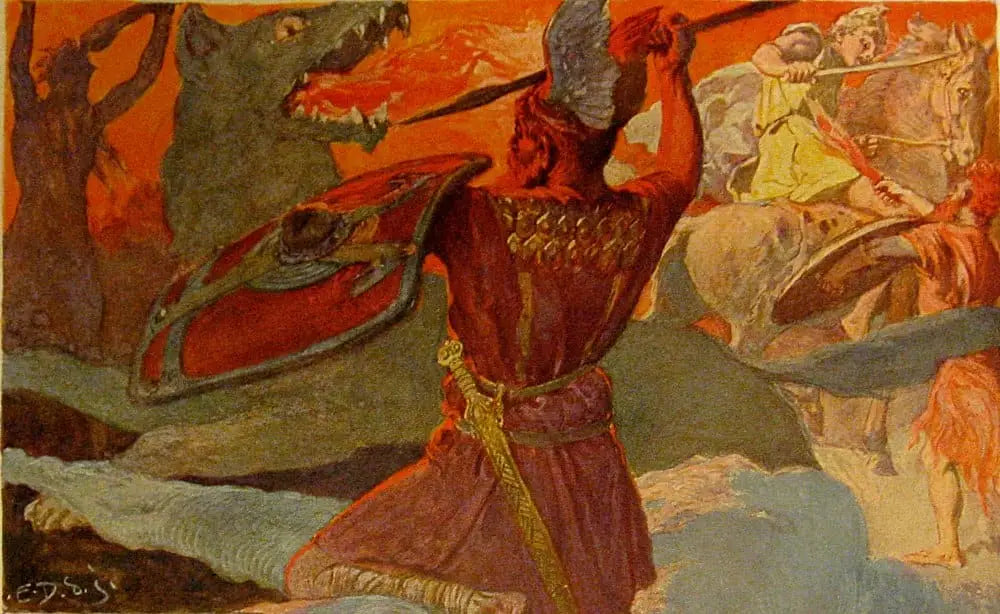
Like Fenrir and Garm the hellhound, Loki will be trapped until Ragnarok, when he will break free and lead the forces of chaos.
In the final war, Loki must face Heimdall in single combat. Heimdall cuts off Loki's head, but also dies himself.
Margaret Clunies Ross has described Baldr's death and Loki's punishment as the end of the mythic period in Norse cosmology. She believes that these were the events that sealed the fate of the gods and set in motion the causal chain that leads inevitably to Ragnarok.
In Völuspá, Ragnarok immediately followed the events surrounding Baldr's death and the gods' punishment of Loki.
The event is described as a gradual breakdown of the previous world order before total destruction takes place. In several of the texts dealing with Ragnarok, Loki is the main antagonist and leader of the gods' enemies.
Lokasenna
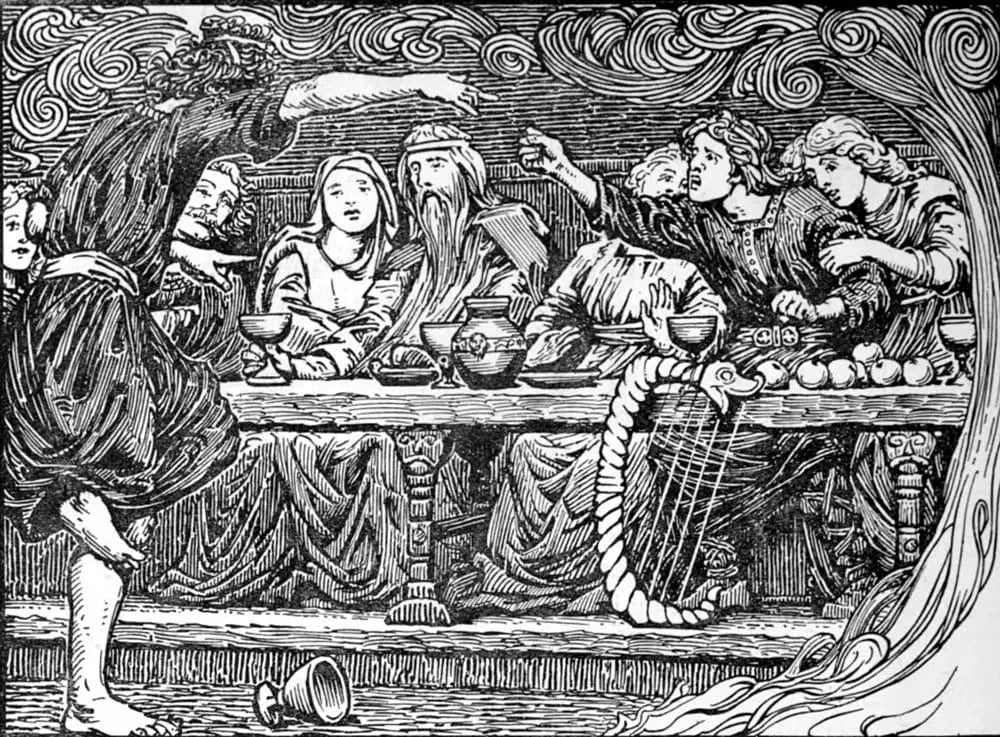
The Lokasenna poem begins with introductory prose detailing that Aegir was hosting an event in his hall for some gods and elves.
In the scene, the gods praise the servants Fimafeng and Eldir, and Loki kills Fimafeng for not being able to bear to hear it.
In response, the gods take their shields and attack Loki, chasing him from the hall into the forest. Eventually, the gods return to the hall and continue drinking.
Loki returns to the scene, and finds Eldir outside the hall. Starting the poem, Loki greets him and asks him to tell what the gods have been discussing since his absence.
Eldir replies that they discuss their weapons and their warlike qualities, and that nothing friendly was said about Loki. Loki says that he will enter back to the hall, and that until the end he would induce discussion among the gods. He enters the hall, and everyone is muted by his presence.
Thirsty, Loki cries out that he had returned from a long journey to ask the gods for a dose of mead. Calling them arrogant, he questions why they are silent, and demands that they find him a chair, or kick him out of the place.
The god Bragi is the first to respond, saying that Loki would not have a chair. Loki does not answer him directly, but directs his attention to Odin, recalling that in the old days Odin said he would never drink if the drink was not brought to both of them.
Odin then asks his son Vidar to stand up, so that Loki can sit down and stop blaming the gods present. Vidar stands up and pours Loki a drink.
Before drinking, he asks for a toast to the gods, except to Bragi, who replies that he would provide a horse, a sword, and a ring from his possessions so that he would not be looked down upon by the other gods.
As Loki accuses him, he hears that outside the hall Bragi would have his enemy's head as a prize for his lies. He replies that Bragi was brave only sitting down, and would run when facing a man of spirit.
The goddess Idunn interrupts, asking Bragi to kill Loki in that hall, out of respect for his family. Loki asks her to be quiet, accusing her, and is answered that she would like to see them duel. The goddess Gefjun agrees the reason the two duel, and is answered by Loki with no accusation.
Odin says that Loki would be insane to make Gefjun his enemy, since her wisdom with the destiny of men would be as great as Odin's own.
The two then begin to exchange insults about past events. Frigg, Odin's goddess and wife, argues that their past should not be told in front of others, and Loki starts insulting her as well, which also happens with Freya and Njord, among others.
Eventually, Thor arrives on the scene and tells Loki to shut up, calling him an evil being and saying that with his hammer Mjölnir he would silence him. The two also begin to argue, ending Lokasenna's poem.
Finally, there is prose detailing Loki leaving the hall, turning into a salmon, and hiding in the waterfalls of Franangrsfors, where the Aesir have captured him.
Loki is arrested, and Skadi places a snake over his head, from which poison is dropped. Loki's wife Sigyn sits down next to him and begins to collect the poison in defense of her husband.
As the vessel fills up, she constantly leaves the place to pour the liquid, and during this time the toxic liquid falls on him, causing him such pain that the entire earth shakes with his scream, thus generating the earthquakes.
Thrymskvida
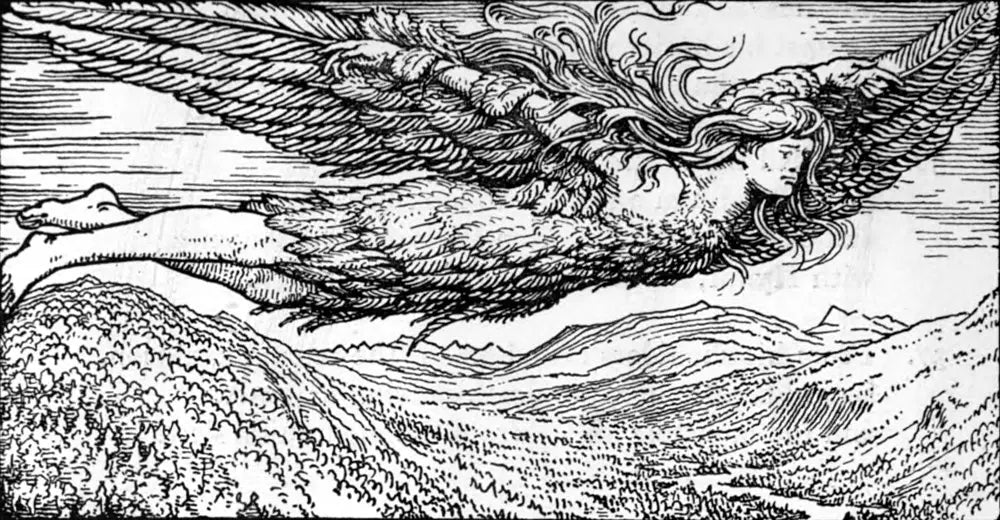
Thor one day wakes up and realizes the loss of his hammer Mjolnir. He goes to meet Loki, and the two go to Freya's court.
The goddess had a cloak of falcon feathers that gave her the ability to transform into any bird and fly through the various worlds.
Loki asks her to borrow her cloack so that he can look for the lost hammer, to which she agrees.
In Jotunheim, the giant Thrym is sitting on a tumulus and sees Loki coming. He asks what is going on between the gods and the elves for Loki to be alone in that place.
Loki replies that he had bad news for gods and elves, Thor's hammer was missing. The giant replies that he had hidden Mjolnir underground, and that he would return it only if Freya was brought to become his wife. Loki then leaves the place, and returns to the presence of the gods.
Thor questions the success of Loki's quest. Loki tells him that the hammer is with Thrym, but that it would only be returned if Freya was brought to him to become his wife.

The two go to meet the goddess and ask her to dress as a bride so that she would go to Jotunheim. Outraged, she protests with hatred, causing her Brisingamen necklace to fall off, and refusing to do such a thing.
As a result, the gods meet to discuss the matter. Heimdall suggests that Thor disguise himself and dress as a bride and go to the scene, which is rejected by Thor.
But Loki supports the idea, saying that this would be the only way to get the hammer back. He argues that without that hammer, the giants could invade Asgard.
The gods then dress Thor as a bride, Loki disguises himself as a woman to accompany him as a helper, and the two then set off for Jotunheim.
Riding together on the chariot driven by goats, the two arrive at the place. Thrym commands the giants in his hall to prepare him for the ceremony.
In the early evening, Loki and Thor meet with Thrym, Thor eats and drinks fiercely, consuming whole animals and much mead. Thrym finds such behavior strange, but Loki, sitting next to him and realizing the situation, excuses himself and claims that "Freya" had not eaten for eight days, so anxious was she about the wedding.
Thrym lifts his veil and wishes to kiss his bride, but notices the angry eyes staring at him. Loki again apologizes, saying that "she" had not slept for eight nights anxious about the wedding.
The wedding gift is asked for, and the giants bring the Mjolnir to sanctify the bride, and marry the bride and groom under the blessing of the goddess Vár.
Thor exults when he sees the hammer: finally retrieving it, killing all the giants present at the ceremony, and a few more on the way back to Asgard.
Reginsmál
Loki appears in the prose and at the beginning of Reginsmál's poem. The prose introduction details that while the hero Sigurd was cared for by Regin, son of Hreidmar.
Regin tells him that once the gods Odin, Hoenir and Loki went to the waterfalls of Andvara, which had many fish. There they met the Dwarf Regin, who had two brothers: Andvari, who fed by staying at Andvara in the form of a fish, and Otaro, who often went there in the form of an otter.
While the three gods are at the waterfalls, Otaro catches a salmon and eats it on the riverbank; he dies when Loki hits him with a stone.
The gods salute the act, and take the otter's skin to make a pouch. The same night, they meet with Hreidmar (Otaro's father) and show him their catch, including the otter skin.
Regin and his father identify the deceased, and Hreidmar demands that they fill the pouch with gold in exchange for the loss of his son.
Loki is sent for this task, and meets with the goddess Rán, who lends him a net. He returns to Andvara, where he catches Andvari with the net.
Loki demands that the fish-turned-dwarf tell him where his gold is, and goes in search of the treasure. Upon obtaining it, he is still missing one more piece.
Despite losing everything, Andvari still tries to keep his ring, the Andvarinaut, but Loki also takes it. Now in dwarf form, Andvari goes to a rock and curses the lost treasure.
Loki returns, and the three gods give the treasure to Hreidmar, filling the bag. Hreidmar looks at the result, and notices that there is a tiny unfilled part, which forces Odin to add the Andvarinaut.
Loki says that they now had possession of the gold, and that it was cursed, which would cause Hreidmar and Regin to die.
Hreidmar replies that if he had known earlier, he would have killed them, but acts dismissive of the curse. Finally, the dwarf king casts them out and the poem continues without any mention of Loki.
Gylfaginning
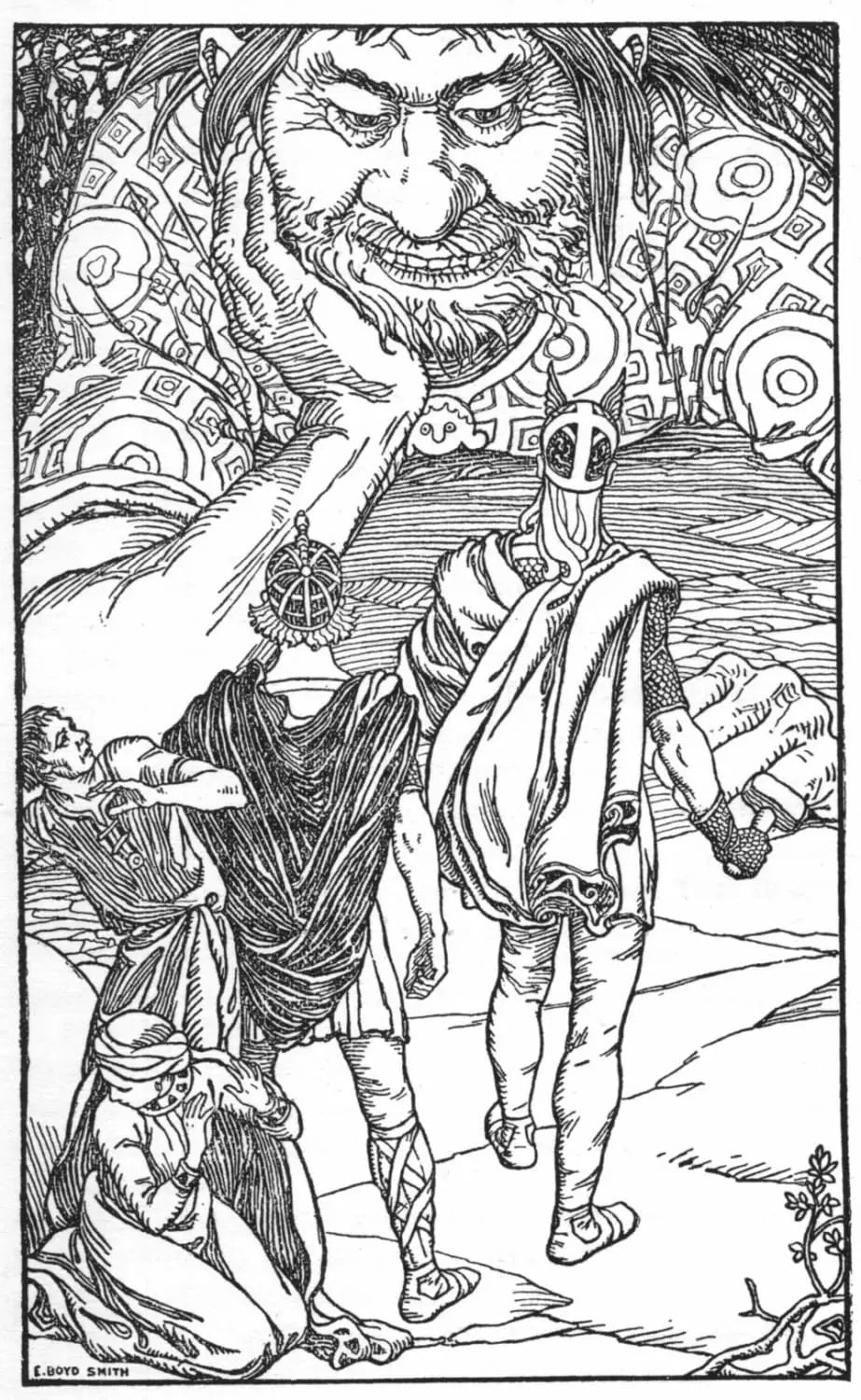
The first reference to Loki in the prose Edda is in the twentieth chapter of the book Gylfaginning.
He is called "slanderer of the gods," "origin of deceit," and "doom of gods and men." His alternate name is said to be Lopt, that he is the son of the giants Fárbauti and Laufey, and the brother of Helblindi and Býleistr.
He is good looking, friendly, but his nature is evil. He is calculating and malicious, but also heroic. Many of his exploits cause great damage or injury, but he is usually quick enough to restore order and avoid complete disaster.
His wife is Sigyn, with whom he had children Nare and Narfi. Another time, he was married to the giant Angerboda, with whom he begot three monstrous creatures: the wolf Fenrir, the great serpent Jormungandr, and the goddess Hel.
The gods knew that their children were raised in Jotunheim, and expected trouble from them because of Angerboda's nature, and especially Loki's.
Chapter 42 tells the story that happened at the beginning of the age of the gods, when they settled in Asgard and built Valhalla. An unidentified builder offers to build a fortification for the gods in exchange for the goddess Freya, the Sun and the Moon.
After some debate, the gods accept the conditions, but impose some restrictions on the builder, including completing the work within the next three seasons without the help of any men.
They were strongly against the conditions, giving up Freya was out of the question, but Loki argues that the builder could not achieve such a feat, and thus the contract would be broken.
In return, the builder asks that he can have the help of his horse Svadilfari. The horse manages to yield extraordinarily well, carrying huge blocks of rock, which surprises the gods.
The two quickly move forward with the walls, and three days before the summer deadline, the builder is almost at the entrance to the fortification.
The gods meet to discuss this unexpected performance, which endangered the very nature of the gods, and come to a consensus that Loki was to blame.
The gods declare that Loki deserves a horrible death if he does not find a plan to force the builder to fail to meet the deadline, and threaten him.
In fear, he swears that he would find a way to do so, no matter what the cost. During the night, the builder and his horse head to another location in search of rocks, and out of the forest comes a mare, who begins to cry.
Attracted by the mare the builder's horse Svadilfari follows her, but she runs away into the forest. This search continues throughout the night, and the builder is forced to stop work that night, outraged.
When the gods realize that that builder was a giant from Jotunheim, they call Thor, who kills him with one blow of the Mjölnir hammer. The forest mare was Loki himself transformed, and some time later he gives birth to an eight-legged gray horse.
It was Sleipnir, considered the best horse of the nine worlds. Loki offers the animal to Odin to redeem his guilt in the affair.
Chapter 44 relates the tale in which Thor and Loki are riding in Thor's chariot driven by goats. They stop at a peasant's house, where they are hosted for the night.
Thor kills his goats, and prepares them for dinner. He invites the peasant's family to share the prepared food. During the meal, the host's son Thjalfi sucks the bone marrow from one of the goats, and when Thor resuscitates his animals, he discovers that one of the goats has a limp. Terrified, the peasant family compensates Thor by giving his sons Þjálfi to Röskva.
Except for the goats, Thor, Loki and the children continue the journey until they reach the forest of Jotunheim, where they continue through the darkness looking for shelter for the night. They find a giant cave, and stay there.
During the night, they feel some earthquakes in the place, which frightens them, except for Thor. In reality, the cave was Skrymir's hideout, which rumbled during the night, causing the tremors. Upon learning of this, the four flee to a nearby tree.
Thor wakes up during the night, and a series of events occurs in which Thor tries to destroy the giant with his hammer, but Skrymir wakes up with each attempt. After the second attempt, Skrymir warns him that if he acted like this in Utgard's castle, it was better to return at that moment, because the king's soldiers would not put up with that attitude.
Eventually, Skrymir leaves through the forest, and the four travelers continue their journey until noon. They find a large castle and an open area.
The castle is so large that they must bend over completely to see the top of the building. At the entrance is a gate, and Thor realizes that he cannot open it.
Together, the four of them manage to open the gate, walk through the entrance hall, and notice two large benches on which sit giants.
Among the giants they identify Utgard-Loki, the king of the castle, who turns to the visitors and greets them. King Badu challenges the visitors to some challenges, and Loki takes the initiative.
He says that none of those present can eat their food as fast as he can, and at this, one of Utgard-Loki's servants introduces himself. Unexpectedly, Loki loses.
Next, Thor is challenged to a drinking test, and he loses as well. Next, Utgard-Loki challenges Thor to lift the paw of his cat, and Thor fails again.
Finally, the giant king's old nanny, Eli, challenges Thor to a fight, and he wins. Thor and Loki leave the giants' kingdom humiliated, but are later comforted by a messenger, who tells them the truth about the challenges:
Loki had lost to wildfire, something that devours everything; Thor's mead horn had been connected to the ocean, so he never finished it-though the god of thunder drank so much that the sea suffered a remarkable denouement; the cat's paw that Thor had been unable to lift was Jormungardr's giant tail disguised by magic, while Eli was actually old age, something that nothing and no one can overcome.
At another point in Gylfaginning, there is the description of Baldr's death, the first in a series of events that would lead to Ragnarök. The story has an outcome analogous to Loki's fate at the end of Lokasenna, from the Edda in verse.
Baldr was known for spreading goodwill and peace, which, along with his popularity, angered Loki. Baldr then begins to have nightmares about his own death.
The dream is considered prophetic, and he is depressed by his fate, causing his mother to demand that all objects in the world never harm her son. All except for one mistletoe: Frigga considered him too irrelevant for that, and too young to take any oath.
Loki turns into a woman and learns of this exception by talking to Frigga, which motivates him to make a magic mistletoe arrow, and goes to meet the gods, who are amused to throw objects at Baldr and see them bounce or deflect without doing any harm to the young god.
Loki gives his spear to Baldr's brother, the blind god Hodr, who accidentally kills his brother.
In disguise, Loki arrives and offers to help, providing him with the arrow and prompting him to aim it at his brother. For this act, Odin and the giant Rindr beget their son Váli, who would grow up to punish Hodr.
According to the traditions, Baldr was buried on his ship, Hringhorni.
After Frigg's request, those present are warned through the messenger Hermod that Hel promises to release Baldr from the underworld if all living things mourn his death.
Everyone complies with the request, except the giantess Thokk, who refuses to mourn the loss. Therefore, Baldr should remain in the underworld until Ragnarök.
When the gods discover that the giantess was none other than Loki in disguise, they pursue him and bind him to three rocks. They attach a snake over his head, which drips poison onto his face.
Skáldskaparmál
The Skáldskaparmál describes that the sons of Ivaldi are dwarves who, challenged by Loki, built Frey's magic ship (Skidbladnir), Odin's invincible spear (Gungnir) and Sif's golden hair, thus replacing the hair cut by Loki (this being the main purpose of the challenge; after cutting Sif's hair in mischief, Loki had been forced by her husband, Thor, to compensate her for it).
Such objects were highly prized by the gods, and once Loki bet the dwarf Brokk his own head that his brother Eitri could not build objects of the same quality.
To hinder them, Loki turns himself into a bee, constantly stinging them. However, even with the difficulties, this competition resulted in the creation of Frey's boar (Gullinbursti), Odin's ring (Draupnir), and Thor's hammer (Mjölnir).
The gods judged all the objects and considered Brokk's works even greater than those of Ivaldi's sons, and he won the bet. Losing, Loki flees after being at the mercy of the dwarves. However, at the dwarves' request he is captured by Thor and turned over to his brothers.
But Loki is cunning, and argues that if his head is cut off, his neck would be damaged, and that was not part of the bet. But the dwarves are content to sew his lips shut, as they judged that Loki talked too much. He manages to remove the thread and escape.
Archeological Sources
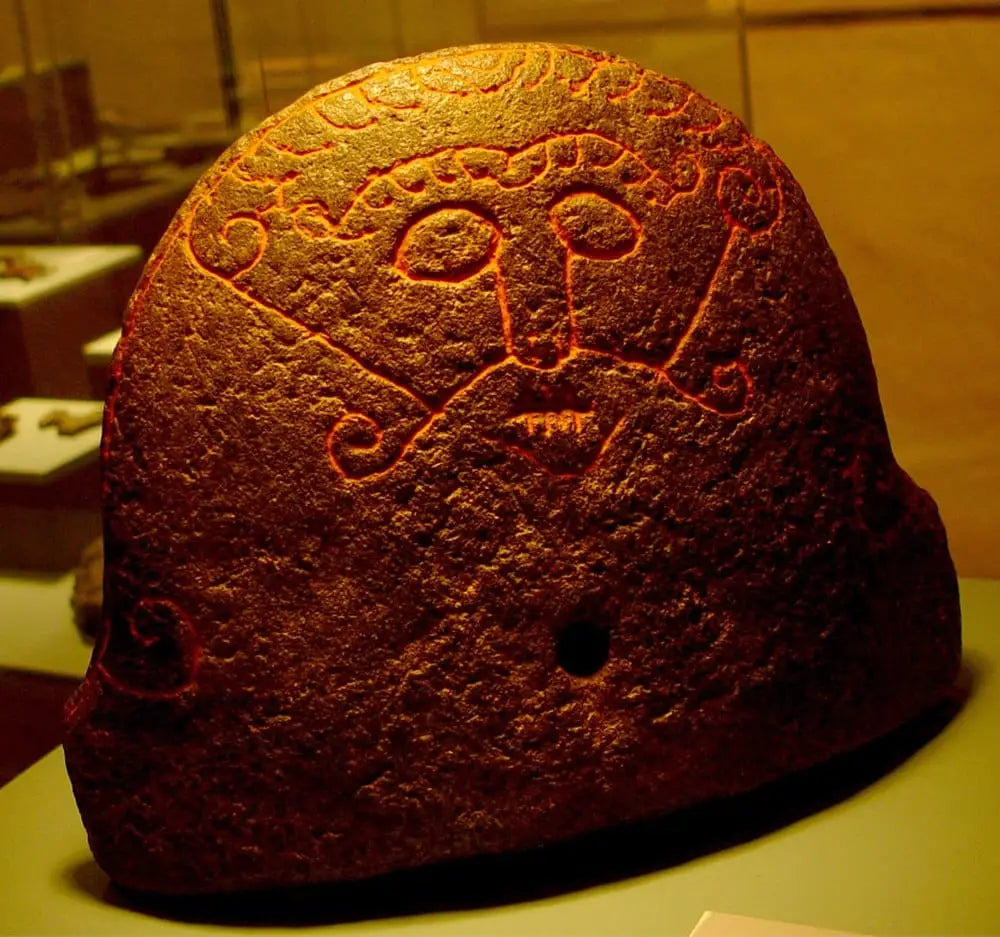
In 1950, a semicircular flat stone with a man's head carved on it was found on the beach near Snaptun in Denmark. The relief depicts a man's head with a twisted moustache and a mouth with a hole throughout the stone, where there are scratches or scars on the lips.
It was made on a soapstone that originated in Norway or Sweden, and dates to around 1000 AD. The figure is usually identified as Loki.
The marks on the lips probably refer to a story in Skáldskaparmál in which one of Ivaldi's sons sewed Loki's lips together.
A partially destroyed late 9th century sandstone was discovered in 1870 and is now set into the facade of the church at Kirkby Stephen, England. It depicts a horned figure being bound. It has been suggested that the relief depicts Loki.
An image of a similar horned and round-shouldered figure has been found in Gainford, County Durham, it is now kept in the library of Durham Cathedral.
The figures on the mid-11th century Gosforth Cross have been interpreted as various figures from Norse mythology similar to the Kirkby Stephen stone.
The lower section of the west side of the cross shows a long-haired female figure kneeling and holding an object over the head of another bound figure.
Above them is a coiled snake. This image is usually interpreted as Sigyn caring for Loki.
